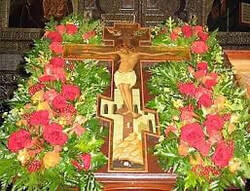 “The Cross is the protector of the whole world; the Cross is the splendour of the Church; the Cross is the glory of kings; the Cross is the support of the faithful; the Cross is the glory of angels and the terror of demons!” (Exapostilarion for Wednesdays and Fridays) What an amazing joy it must have been when the Holy Cross on which Our Saviour had been crucified was discovered in 327AD. The Emperor Constantine asked his mother Helena to visit the Holy sites in Jerusalem and to her joy the Holy Cross was discovered. Following this, soon afterwards, The Church of the Holy Sepulchre was built. Over the centuries, the Cross has become the most important sign of our Salvation, indeed we venerate it with great honour for the Cross was not only the instrument of Our Lord’s shameful, yet life-giving death but it was also THE TREE OF LIFE. The Tree of Life noted in the Garden of Eden was guarded by angels once Adam and Eve had fallen from grace and disappeared from view. Now it was brought into view again in the form of the Holy Cross. Thus, we have in our midst the Tree of Life, the enduring sign of our Salvation and the new life brought to us by Our Lord who sacrificed himself upon it.
“When the Cross was planted on earth, the arrogance of the demon fell and disappeared, for Adam returned to Paradise from which he had once been expelled. Paradise was opened for all; glory to You, O Holy God, who have willed so to do!” (Canon, Tone 2) In the Gospel for the Sunday after the Feast (Mark 8: 34 ff), we have these challenging words from Our Lord: “ Whoever desires to come after Me, let him deny himself, and take up his cross and follow me.” What does this mean? It means that we are to embrace fully our life in Christ and ensure that this is at the forefront of all our earthly thoughts and endeavours. Taking up the Cross is not negative and a punitive burden but the very fullness of our life. John Henry Newman, now declared a Saint by the Roman Church, says this: “Fear not that life may come to an end but rather fear that it may never have had a beginning.” This is why St Paul in his letter to the Romans gives this understanding: “None of us lives to himself. and no one dies to himself. For if we live, we live to the Lord; and if we die, we die to the Lord. Therefore, whether we live or die. we are the Lord’s” (Rom 14: 6-9). We are to do all for the Lord, and in our life together, for only in this, is life in fullness. The Holy Cross reminds us of this, everyday, as we gaze upon it. We receive the challenge again and again: THIS DAY TO TAKE UP THE CROSS that your life may be transformed; that you may enter into the fullness of life. St Paul also says; “ The message of the Cross is foolishness to those who are perishing, but to those who are being saved it is the power of God”. It seems that the Leaders of the Established Church of this land have been silent at a national level, throughout the whole of this coronavirus episode . At a national level there has been no comforting and no encouragement and no enlightening guidance on offer. Above all there has been no voice of prophecy giving a clear message of what the Church is about and what the Gospel of Christ has to offer. No proclamation that the message of the Cross is the power of God to those who seek to be saved and live life to the full. Just quoting St Paul and St John Henry Newman as above could have been a focus of such prophecy. It has to be proclaimed loud and clear, that the way forward for the nation, is not only to overcome the Coronavirus, and to restore the economy, though this is necessary. Rather, it is for all to realise that without God, our Creator and the one who has given us new life, there is no real life and there is no safe future. This land and its people must return to Christian roots for sustenance and life and a new way forward. As Saint John Henry said; all should “fear not that life may come to an end but rather fear that it may never have had a beginning”. Only life in God gives fullness of life. Without God at the helm, all is lost. On this day we hold high the Cross, the Life Saving Cross, the Tree of Life and challenge ourselves and all in this land to live for Christ, to take up the Cross of love, the Cross of salvation. The Cross can lead us forward to renewal and fulfilment of life. For “The Tree of Life, the true spiritual vine, is hung upon the tree of the Cross, as a fountain of sweet healing wine for all mankind” (Sunday, tone 4, matins ode 3). We are now lifted up, by the Cross, from the Fall; and saved from the destructive wood of the forbidden tree. Fr David
0 Comments
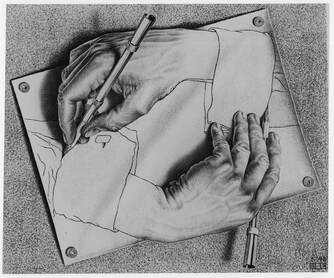 As one looks at the drawing above; we see a hand drawing another hand, but which is drawing the first hand, but which hand is drawing which? Our mind is challenged, it doesn’t make sense! This is so often true also of the faith we profess. We are often called to flip things upside down, to view things from a different perspective, to accept that, which to many, makes no sense or is illogical. It is all so paradoxical. Interestingly, Orthodox and Paradox are two words having much in common. The "dox" that ends both terms have roots in the Greek word doxa, which means "belief" or "opinion."(In later Christian usage, doxa came to mean "glory," but only as an extension of its much older philosophical meaning, which is "belief"). “Ortho” has a Greek root meaning to straight, correct, or upright.And so, if a doxa is an opinion or a belief, then ortho-doxa is a "correct or right belief."Similarly, the prefix “para” has a Greek root meaning "beyond" or "outside of"; and so, something that is "para doxa,", is beyond belief, contradicting what we might commonly believe to be true. For many, that which is ‘Orthodox’ often appears to be a ‘Paradox’. For instance, we are monotheists, we believe in one God. But we call that God a Trinity, one God in three persons; but how can God be both 1 and 3? – A paradox? Again, The Orthodox Church believes that Our Lord, Jesus, while on earth, was fully Immortal God and, at the same time, fully Mortal Man. How can He be both? And then of course we have the Mother of our Lord; A virgin mother? "O Mother that hath known no man, thou didst conceive, not experiencing corruption, lending a body to the Word, the Creator of all, becoming a receptacle to thine insupportable Creator, a dwelling-place to thine incomprehensible Maker." ________________________________________ On Monday it is the feast of The Elevation of the Holy Cross, also referred to as the Exaltation of the Cross, one of the Great Feasts of the Orthodox Church. This feast commemorates two events: Firstly, The finding of the Cross by the Empress Helen (the mother of St. Constantine the Great) on Golgotha in 326 AD, the place where Christ was crucified. Then recovery of the Cross from the Persians who had taken the Cross as a prize after sacking Jerusalem in 614 AD. It was recovered by the forces of the Byzantine Empire in 627 AD. The Cross was taken into the temple of the Resurrection, where it was joyously held up for veneration by the faithful. Now, when it comes to a paradox, is there anything more paradoxical than the Cross of Our Lord? As the Apostle Paul writes 1 Corinthians I: 23, “But we preach Christ crucified, unto the Jews a stumbling block, and unto the Greeks foolishness;” The Apostle tells us that the Jews seek signs because that is what the prophets gave them, although even then they did not believe. Their expectation of the Messiah was of one who would triumph over Israel’s enemies and establish Jerusalem as the centre of the world. Death by crucifixion was shameful and unthinkable. Their Messiah was to be exalted, not humiliated. Greek speculative philosophy generally regarded the realm of the spirit and ideas as good and vastly superior to the inferior world of matter. With such a world view the whole idea of a God who became man and assumed the limitations of mortality by assuming a material body subject to suffering and death, was unthinkable. For Greeks salvation was through the mystical reception of knowledge, which would free them from the bondage of the physical world and enable them to share in the spiritual realm. The whole cycle of creation and redemption was unthinkable to them. At the heart of the Orthodox Christian mysteries there is usually a paradox: The Creator who becomes a creature; the virgin who gives birth but remains a virgin; of the way to life being through death; of the poor being rich; of the weak being strong. To the unbeliever it is simply contradiction and disingenuous, proving the foolishness of the Gospel, and the credulity of Christians. To the believer, however, the wisdom of God is not the same as the wisdom of this world. Origen states that it is the world’s wisdom that is foolish “even though the simplicity of God’s wisdom makes those who have it appear foolish in the eyes of the world. Believers have received this divine wisdom and thus in this world appear to be fools.” It is not surprising therefore that the Orthodox Church has a whole category of saints known as “Fools for Christ.” From an object of destruction and shame, the cross has become the emblem of pride and respect. We raise it high over our churches; we decorate our most sacred objects with it whether they are buildings, or fabrics; we suspend it around our necks; we sign ourselves with the cross when we begin our prayers; we use it to bless our food. The Cross is a ubiquitous and potent symbol. In itself it is a means of grace. Saint Antony the Great speaks of defending himself by faith and the sign of the cross. Drawing Hands, Drawing by Maurits Cornelis Escher (1898-1972), Drawn in 1948, Pencil on paper 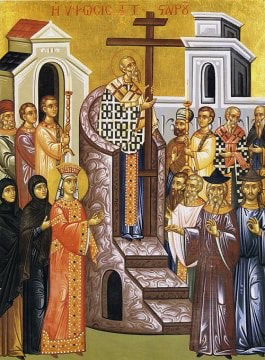 Troparion of the Exaltation of the Cross O Lord, save Thy people, and bless Thine inheritance. Grant victories to the Orthodox Christians over their adversaries; and by virtue of Thy Cross, preserve Thy habitation. 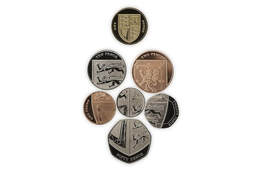 The 13th Sunday After Pentecost (Matthew 21: 33-42 – A trap for Jesus) I remember once being told that, on becoming a Christian, the last thing to be converted is your wallet! For many people money and finances are considered to be very personal and of course we often hear the misquoted 1 Timothy 6:10, “the love of money is the root of all of evil”. But what do we really know about money? For instance, did you know that Pound sterling is the world's oldest currency still in use. That most banknotes contain traces of cocaine. With so much anxiety about hygiene and cleanliness, did you realise that the average European banknote is home to 26,000 colonies of bacteria. Perhaps you think that the penny in your pocket isn't worth very much? Uzbekistan's tiyin is worth around 3,000 times less than a British penny. How about this one! Did you know that one can arrange the newer 1p, 2p, 5p, 10p, 20p and 50p coins to reveal an esoteric shield design that mimics the coat of arms on the £1 coin? This clever feature was created by designer Matthew Dent in 2008. It would be easy to think that our Gospel reading was about money and whether the Jews should pay taxes to the Roman authorities. The Pharisees and the Herodians anticipated that Jesus would oppose the tax, their purpose being to hand him over to the power and authority of the governor. The questioners flattered Jesus by praising his integrity, impartiality, and devotion to truth. Then they asked him whether or not it is right for Jews to pay the taxes demanded by Caesar. Jesus first called them hypocrites and then asked one of them to produce a Roman coin that would be suitable for paying Caesar's tax. One of them showed him a Roman Coin (a denarius, and he asked them whose head and inscription were on it. They answered, "Caesar's," and he responded: "Render therefore unto Caesar the things which are Caesar's; and unto God the things that are God's". The questioners “marvelled"; unable to trap him any further, and being satisfied with the answer, they went away. Because the denarius bears the image of Caesar it is right and proper to give it to Caesar. What if we extend this same principle to ourselves, we each bear the image of God; we therefore belong to God. So, what does that require us to render to God? The answer of cause is EVERYTHING! God is Lord over all! Interestingly; the value of 6,000 denarii was equal to one talent. A talent being a unit of weight of approximately 80 pounds (36 kg), and when used as a unit of money, was valued for that weight of silver. Now, we may not possess denarii but we each have a few ‘talents’, natural aptitude or skills; talents that we can offer for the service of our Lord. But, perhaps more importantly, we each have many gifts. As the Dutch Catholic priest, professor, writer and theologian, Henri J.M. Nouwen reminds us these gifts are how we express our humanity, they are a part of who we are; friendship, kindness, patience, joy, peace, forgiveness, gentleness, love, hope, trust and many, many more. These are true gift; gifts that have the power to bring healing to the deepest hurts. However, A gift only becomes a gift when it is received and accepted by another and we can be sure that anything that we offer to our Lord with love and faith will be received “ …and it will be given to you: good measure, pressed down, shaken together, and running over will be put into your bosom. For with the same measure that you use, it will be measured back to you.” [Luke 6:38] With prayer and love in XC Fr Julian Caesar's Coin, by Peter Paul Rubens (1612-1614) |
Parish Blog
This mainly contains homilies and messages from our priests, although there is some scope to share thoughts and interesting articles which we may want to share with others Archives
October 2022
Categories |
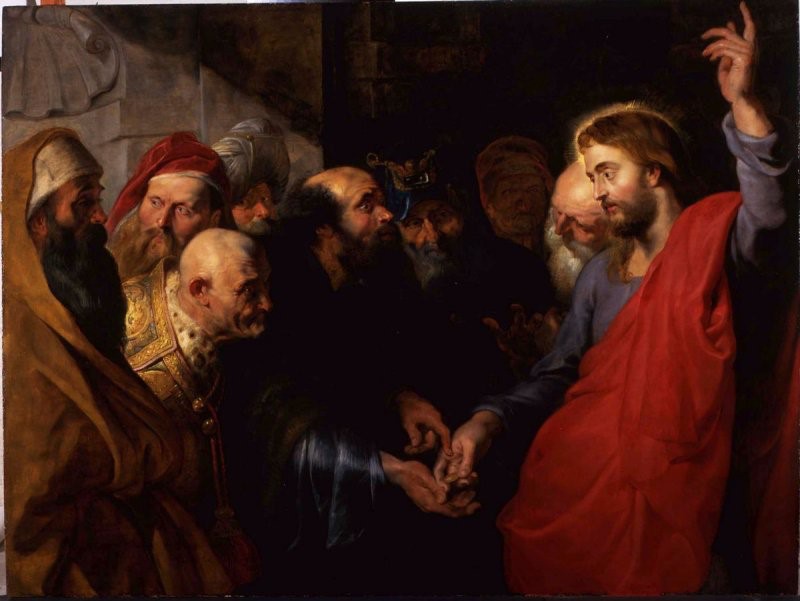
 RSS Feed
RSS Feed